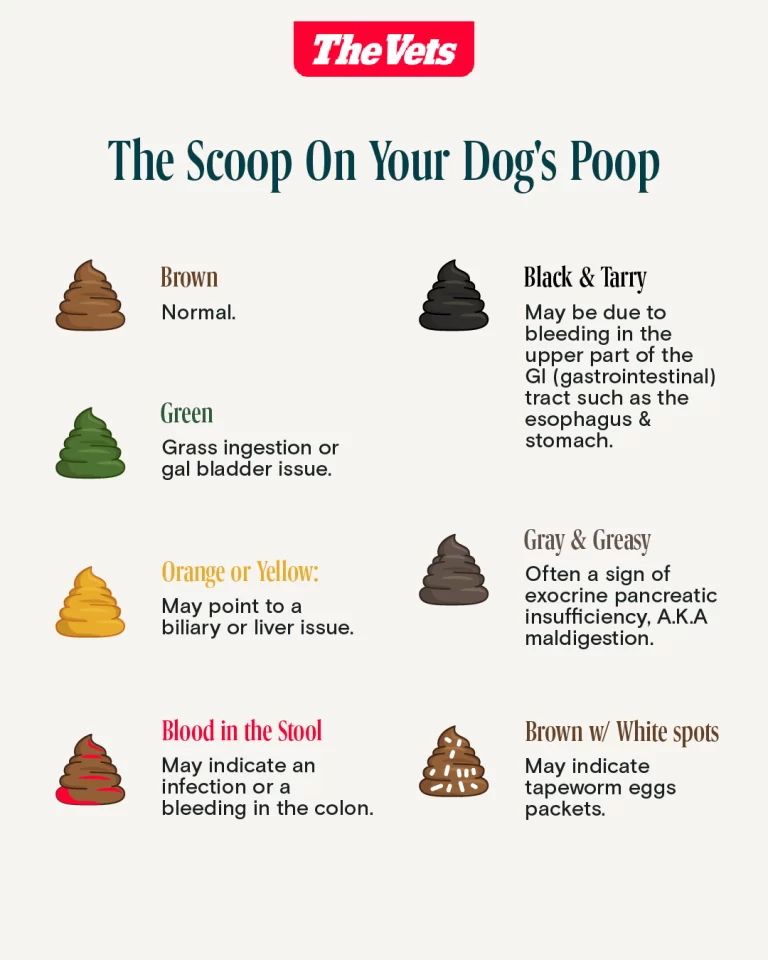If your dog is pooping blood, it could indicate a serious health issue. Bloody stool in dogs may result from gastrointestinal problems, parasites, infections, or even cancer.
If you notice blood in your dog’s stool, it’s crucial to seek immediate veterinary attention to determine the underlying cause and provide appropriate treatment. Seeing blood in your dog’s stool can be alarming and may indicate a need for urgent medical attention.
It’s important to understand the potential causes and take prompt action to ensure your pet’s well-being. By recognizing the significance of this symptom and seeking professional assistance, you can help your dog receive the necessary care and improve their chances of a successful recovery. Understanding the potential reasons behind bloody stool in dogs can empower you to act decisively and responsibly when facing this concerning issue.
Causes Of Blood In Dog’s Stool
The presence of blood in your dog’s stool can be a cause for concern and may indicate an underlying health issue. Understanding the potential causes can help you determine the best course of action for your furry friend’s well-being. Here are some common reasons why your dog may be pooping blood:
Gastrointestinal Infections
A common cause of blood in a dog’s stool is gastrointestinal infections. These infections can be caused by viruses, bacteria, or parasites. Viral infections such as parvovirus or bacterial infections like salmonella can lead to bloody stool. Parasites like giardia or coccidia can also cause gastrointestinal infections. If your dog has a gastrointestinal infection, they may exhibit symptoms such as diarrhea, vomiting, or abdominal pain.
Parasites And Worms
Another common cause of blood in a dog’s stool is parasites and worms. Intestinal parasites like hookworms or whipworms can irritate the lining of the intestines, leading to bleeding. Tapeworms can also cause your dog’s stool to appear bloody. If your dog has been exposed to infected soil, water, or other animals, they may be at a higher risk of developing a parasite or worm infestation.
Dietary Indiscretion
Poor dietary choices or dietary indiscretion can sometimes lead to blood in a dog’s stool. If your dog ingests something that is indigestible or irritating, such as bones, foreign objects, or toxic substances, it can cause irritation and inflammation in the gastrointestinal tract. This can result in symptoms such as diarrhea, vomiting, and blood in the stool. Keeping a close eye on your dog’s diet and preventing access to harmful substances can help avoid these issues.
Inflammatory Bowel Disease
Inflammatory bowel disease (IBD) is a chronic condition that can cause inflammation and irritation in the gastrointestinal tract. This inflammation can lead to ulcers, bleeding, and blood in the stool. Dogs with IBD may experience symptoms such as chronic diarrhea, weight loss, and a decreased appetite. If you notice blood in your dog’s stool along with these symptoms, it’s important to consult with your veterinarian for a proper diagnosis and treatment plan.
Foreign Objects Or Trauma
Ingesting foreign objects or experiencing trauma to the gastrointestinal tract can cause blood in a dog’s stool. If your dog has swallowed something sharp or abrasive, it can cause irritation and bleeding. Trauma to the abdomen, such as being hit by a car or falling from a height, can also lead to blood in the stool. If you suspect your dog has ingested a foreign object or experienced trauma, seek immediate veterinary attention to prevent further complications.
Remember, if you notice blood in your dog’s stool, it’s essential to consult with your veterinarian for a proper diagnosis and appropriate treatment. By identifying the underlying cause, you can help your furry friend get back to their healthy and happy self.

Credit: www.purina.co.uk
Symptoms And Diagnosis
When it comes to your dog’s health, it’s crucial to be attentive to any unusual symptoms, including changes in their bathroom habits. If you notice that your dog is pooping blood, it can be a cause for concern. Understanding the symptoms and seeking a proper diagnosis is essential for their well-being.
Visible Blood In Stool
If you observe visible blood in your dog’s stool, it may appear red, dark, or tarry. This can indicate a range of potential issues, from gastrointestinal irritation to more severe conditions, prompting the need for immediate veterinary assessment.
Diarrhea Or Changes In Stool Consistency
Diarrhea or alterations in stool consistency accompanied by blood could signify underlying gastrointestinal problems. Monitoring these changes and providing this information to your veterinarian can aid in the diagnostic process.
Abdominal Discomfort Or Pain
When your dog displays signs of abdominal discomfort or pain, such as vocalizing or reluctance to be touched in the belly area, it may indicate the presence of an underlying issue that requires professional evaluation.
Vomiting Or Loss Of Appetite
Vomiting or a loss of appetite in conjunction with bloody stool may signal a complex health issue. These symptoms serve as vital indicators for your veterinarian to consider during the diagnostic assessment.
Diagnostic Procedures
Upon observing these symptoms, seek prompt veterinary attention. Diagnostic procedures, including fecal examinations, blood tests, and imaging studies, are typically performed to identify the underlying cause and determine the most effective treatment plan for your dog.
Treatment Options
When it comes to treating bloody stools in dogs, there are several important treatment options that your veterinarian may recommend.
Medication For Infections
Your vet may prescribe antibiotics to treat bacterial infections that could be causing the bloody stool. It’s crucial to administer the medication exactly as directed to effectively combat the infection.
Deworming And Parasite Treatment
If your dog is found to have worms or other intestinal parasites, deworming medication or specific parasite treatment will be prescribed to eliminate the parasites causing the issue.
Dietary Changes And Fiber Supplements
Dietary changes, such as switching to a bland diet or a high-fiber diet, can help alleviate digestive issues. Your vet may recommend fiber supplements to promote better digestion and ease the passage of stool.
Anti-inflammatory Drugs
In some cases, anti-inflammatory drugs may be prescribed to reduce inflammation in the digestive tract. These medications can help alleviate discomfort and promote healing.
Surgery Or Removal Of Foreign Objects
If there are signs of a blockage or the presence of foreign objects in the digestive tract, surgery may be necessary. This can involve removing the obstructive object to restore normal bowel movements.

Credit: www.petmd.com
Prevention
If you notice that your dog is pooping blood, it is important to take immediate action. One of the best ways to prevent this from happening is to focus on proper hygiene and sanitation for your furry friend. Regular veterinary check-ups, a balanced and quality diet, and avoiding certain foods and items can also greatly contribute to your dog’s overall health and well-being. Lastly, limiting your dog’s exposure to infections is crucial in keeping their digestive system healthy. Let’s explore each prevention method in detail.
Proper Hygiene And Sanitation
Ensuring that your dog’s living environment is clean and hygienic is essential for their well-being. Regularly cleaning their bedding, toys, and eating utensils can help prevent the spread of harmful bacteria and parasites. Additionally, keeping their living area free from waste and dirt can minimize the risk of infections and gastrointestinal issues.
Regular Veterinary Check-ups
Regular visits to the veterinarian can help prevent potential health issues and catch any underlying problems early on. Your veterinarian will be able to assess your dog’s overall health and provide you with personalized advice to keep their digestive system in top condition. They may also recommend routine vaccinations and deworming treatments to further protect your furry friend.
Balanced And Quality Diet
A well-balanced and nutritious diet is vital for your dog’s digestive health. Providing them with high-quality dog food that meets their specific nutritional needs can help prevent gastrointestinal disorders. Avoid feeding your dog table scraps or low-quality food that may contain harmful ingredients or excessive amounts of fat. Make sure your dog has access to clean and fresh water at all times to stay properly hydrated.
Avoidance Of Certain Foods And Items
There are certain foods and items that can be toxic or potentially hazardous to your dog’s digestive system. Avoid feeding them chocolate, grapes, raisins, onions, garlic, and foods that are high in fat. Additionally, keep your dog away from household items such as cleaning products, medications, and poisonous plants, as they can cause serious health issues if ingested.
Limited Exposure To Infections
Preventing your dog from getting infected by harmful viruses, bacteria, and parasites is crucial for their well-being. Keep your furry friend away from environments where infectious diseases may be prevalent, such as dog parks or areas with unsanitary conditions. Regularly clean and sanitize their living area to minimize the risk of infections. Additionally, make sure your dog is up to date on their vaccinations and follow your veterinarian’s recommendations for preventative treatments.
When To Seek Veterinary Care
It can be alarming to see blood in your dog’s poop, and it’s important not to ignore this symptom. While it may sometimes resolve on its own, there are situations where immediate veterinary care is necessary. Here are the factors to consider when deciding if you should take your dog to the vet:
Persistent Or Severe Symptoms
If your dog’s poop continues to have blood in it over a prolonged period or if the amount of blood is significant, it is crucial to seek veterinary care. Persistent or severe symptoms can indicate an underlying medical condition that needs to be addressed. Additionally, if your dog is experiencing other concerning symptoms such as diarrhea, vomiting, or lethargy along with the bloody stool, it is a clear indication that veterinary attention is necessary.
Sudden Change In Behavior
A sudden change in behavior can be a sign that something is seriously wrong with your furry friend. If your dog is displaying uncharacteristic behaviors such as loss of appetite, excessive thirst, or difficulty urinating, and there is blood in their poop, it’s important to consult a veterinarian. These changes in behavior, combined with the presence of blood in the stool, may indicate a more serious underlying condition that requires immediate attention.
Presence Of Other Health Issues
If your dog has pre-existing health issues, such as chronic conditions or a compromised immune system, it’s essential to be extra vigilant when blood appears in their stool. Even if the symptoms seem mild, the presence of other health issues can make them more vulnerable, and seeking veterinary care promptly can help prevent further complications.
Breed Predisposition Or Genetic Factors
Some dog breeds are more prone to certain health conditions, including digestive issues that can cause blood in the poop. If your dog belongs to a breed with a known predisposition to gastrointestinal problems, it is advisable to seek veterinary care as soon as you notice blood in their stool. Breed predisposition or genetic factors can make your dog more susceptible to specific conditions, and early intervention is key to ensuring their health and well-being.
Expert Advice And Guidance
Your veterinarian is your best source of expert advice and guidance when it comes to your dog’s health. If you are unsure whether the presence of blood in your dog’s poop warrants a trip to the vet, it’s always wise to consult with a professional. Veterinarians have the knowledge and experience to accurately assess your dog’s situation and provide the necessary care or further investigations needed.
In conclusion, if your dog is pooping blood, it is crucial to assess the situation and consider the factors mentioned above. While mild cases may resolve on their own, persistent or severe symptoms, sudden changes in behavior, presence of other health issues, breed predisposition, and expert advice and guidance from a veterinarian should all be taken into consideration when deciding whether to seek veterinary care.
:strip_icc()/hemorrhagic-gastroenteritis-hge-in-dogs-338428_sourcefile-cf185dde0f9045219d9eeaddad015bfe.jpg)
Credit: www.thesprucepets.com
Frequently Asked Questions For What Does It Mean If My Dog Is Pooping Blood
What Are The Possible Causes Of Blood In My Dog’s Stool?
Blood in a dog’s stool can be caused by various factors, including parasites, infections, dietary issues, or more serious conditions such as tumors or gastrointestinal disorders. It’s important to seek veterinary care to determine the underlying cause and provide appropriate treatment.
Is Blood In A Dog’s Stool An Emergency?
Though not always an emergency, blood in a dog’s stool should be taken seriously. If your dog is experiencing other symptoms like vomiting, diarrhea, or abdominal pain, it’s recommended to contact a veterinarian immediately. Prompt medical attention can help identify and address the underlying cause.
How Should I Respond If My Dog Is Pooping Blood?
If you notice blood in your dog’s stool, it’s advisable to consult a veterinarian. Avoid making any abrupt changes to your dog’s diet or administering over-the-counter medications without professional guidance. Collect a sample of the stool, note any other symptoms, and provide this information during your veterinary visit to aid in diagnosis and treatment.
Conclusion
If you notice your dog pooping blood, it’s important not to panic but to take immediate action. Consult a veterinarian to determine the underlying cause and receive the appropriate treatment. Remember, blood in your dog’s feces can be a sign of various conditions, which require professional diagnosis.
By seeking timely veterinary assistance, you can ensure the health and well-being of your furry friend. It’s always better to be safe than sorry!



